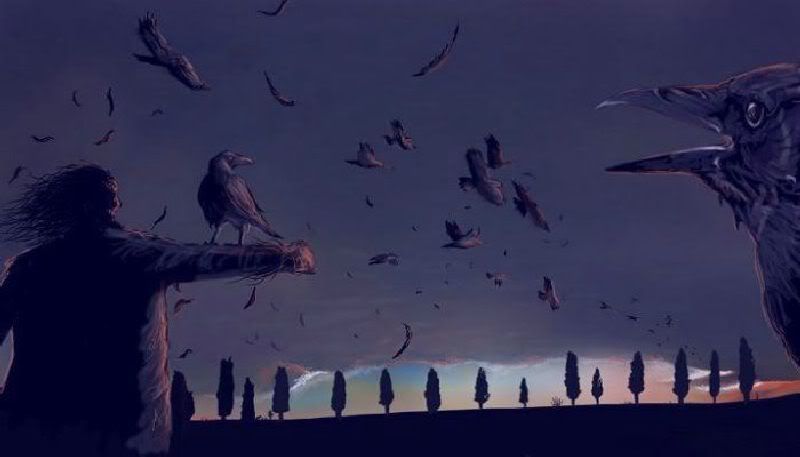(84) The Crow and the Rose
An old Orkney story
On a shore in Deerness, near the entrance of Deersound, is a steep, green slope that rolls down to a shingly beach.
Somewhere on this slope is a wild, pink-coloured rose known as the Rose o' Kytton.
According to legend, some time ago a group of quarrymen working in the area saw that a crow had built a nest near their workplace.
All but one of the workmen thought it would be a fine joke to boil the crow's eggs, just to see how long it took the unfortunate bird to notice they wouldn't hatch.
Despite the protests of the lone objector, the other men went ahead with their cruel joke. When the crow was gone, the eggs were removed from the nest, boiled, and replaced before she returned.
However, the crow knew there was something wrong and also who was responsible for the deed.
Some time later, when the men were back working in the quarry, the crow swooped down and snatched the cap of the man who had objected to the joke.
The man chased after the crow to recover his property.
Finally, when they were a good distance from the quarry, the crow dropped the cap and the man hastily scooped it up. With cap clutched tightly in his hand, he returned to the quarry to find that part of the cliff had collapsed and killed his workmates.
Tradition has it that the crow then flew to the Holy Land to find something that would restore her eggs and make them fertile again. This she found and carried it back to Orkney, also carrying the seed from a rose bush she had rested under on her tail.
When she landed at Kytton, the seed fell to earth where it took root and blossomed.
Thereafter, the pink rose that sprang from this solitary seed was known as the Rose of Kytton.
=============
This folktale closely mirrors the 16th century historical account of Deerness provided by the author Jo Ben. He wrote:
"with the workmen in the gold mine, a crow called aloud three times; the master and some others came out, but five being left, a large stone fell and suffocated the five, all the others being saved."
This tale appears to be a Christianised version of a much older, ancient Norse legend.
In the Faroe Islands, another Norse settlement, the reason men boiled the eggs of crows was to obtain the "Sigrstein" or "Victory Stone"
This was the magical item that the bird would always seek to restore her damaged eggs.
The Victory Stone was thought to be a talisman against attacks from human beings and more importantly, trows and trolls.
A variant of the Rose o' Kytton legend has it that the object the crow took back from the Holy Land glowed and could often be seen by the fishermen working off the Deerness coast.
On a shore in Deerness, near the entrance of Deersound, is a steep, green slope that rolls down to a shingly beach.
Somewhere on this slope is a wild, pink-coloured rose known as the Rose o' Kytton.
According to legend, some time ago a group of quarrymen working in the area saw that a crow had built a nest near their workplace.
All but one of the workmen thought it would be a fine joke to boil the crow's eggs, just to see how long it took the unfortunate bird to notice they wouldn't hatch.
Despite the protests of the lone objector, the other men went ahead with their cruel joke. When the crow was gone, the eggs were removed from the nest, boiled, and replaced before she returned.
However, the crow knew there was something wrong and also who was responsible for the deed.
Some time later, when the men were back working in the quarry, the crow swooped down and snatched the cap of the man who had objected to the joke.
The man chased after the crow to recover his property.
Finally, when they were a good distance from the quarry, the crow dropped the cap and the man hastily scooped it up. With cap clutched tightly in his hand, he returned to the quarry to find that part of the cliff had collapsed and killed his workmates.
Tradition has it that the crow then flew to the Holy Land to find something that would restore her eggs and make them fertile again. This she found and carried it back to Orkney, also carrying the seed from a rose bush she had rested under on her tail.
When she landed at Kytton, the seed fell to earth where it took root and blossomed.
Thereafter, the pink rose that sprang from this solitary seed was known as the Rose of Kytton.
=============
This folktale closely mirrors the 16th century historical account of Deerness provided by the author Jo Ben. He wrote:
"with the workmen in the gold mine, a crow called aloud three times; the master and some others came out, but five being left, a large stone fell and suffocated the five, all the others being saved."
This tale appears to be a Christianised version of a much older, ancient Norse legend.
In the Faroe Islands, another Norse settlement, the reason men boiled the eggs of crows was to obtain the "Sigrstein" or "Victory Stone"
This was the magical item that the bird would always seek to restore her damaged eggs.
The Victory Stone was thought to be a talisman against attacks from human beings and more importantly, trows and trolls.
A variant of the Rose o' Kytton legend has it that the object the crow took back from the Holy Land glowed and could often be seen by the fishermen working off the Deerness coast.

![[Go to Site Index]](http://i6.photobucket.com/albums/y225/Abramelinn/Banner_Crow4.jpg)

<< Home